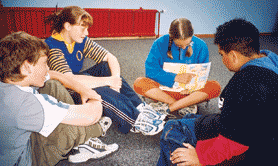![]() ANALYSIS
OF CHILDREN’S WRITTEN AND ORAL LANGUAGE SKILLS
ANALYSIS
OF CHILDREN’S WRITTEN AND ORAL LANGUAGE SKILLS
![]()
Judith
Catton
This
10-week study involved re-analysing a sample of NEMP writing and
oral language tasks to determine what relationship, if any, exists
between students’ writing skills and their oral language
competence. |
The tasks were those completed by 130 students randomly selected from
each year group (4 and 8) of the 2002 NEMP national sample, and were analysed
using English curriculum exemplars. Each student’s performance on
an extended writing task was compared with his or her performance on an
oral language activity. Findings were analysed across year group, gender,
ethnicity, decile band and geographic location, and subsequently matched
with the students’ achievement on a formal grammar task and a writing
self-assessment.
![]()
•
Written language and spoken language achievement were significantly
linked, with oral language providing immediate and useful clues
to aspects of overall language mastery, and quality verbal interactions
important for encouraging students’ speaking and thinking
skills.
|
• Of the variables considered, school decile band was the only significant factor, with higher decile correlating with higher overall performance. • Poor speakers appeared to lack knowledge of an “oral language tone”. They were unable to use language to convey and clarify meaning, and could not give a developed reason for defending a point of view. • Effective speakers tended to use speech for thought rather than simply for identifying and describing. They introduced new topics by using cognitive verbs like “wonder”, “think”, “guess”, “suppose” and “believe”. • At both year levels, effective speakers used various devices such as coordinating conjunctions, made additional or connected comments and used veiled questions to sustain conversation. |
|
| • Those students more skilled in handling the semantic and syntactic structures of oral language were more likely to demonstrate sophistication and maturity in their writing. | ||
![]()
•
Students at both year levels need assistance with their oral and written
language learning, especially making transparent for them the fundamental
differences between speech and writing.
• Students need to hear and read literary constructions in a range
of contexts to be able to use them themselves.
• Some students need more experience with exploratory kinds of talk
where they are encouraged to weigh, evaluate and justify their ideas.
• If teachers are to intervene constructively in teaching of writing
skills, they need to know what particular problems of composition confront
children at different developmental levels.
